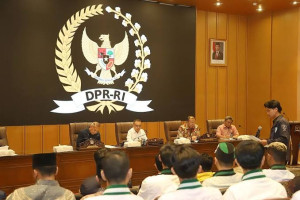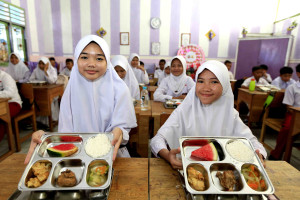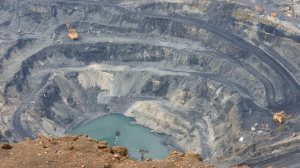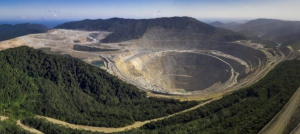Government's plan to ban copper exports may cause 40,000 jobless
The government's plan to fully ban the exports of copper concentrates has worried the Indonesian Mining Association (IMA) over the fate of around 40,000 workers in the industry. The IMA raised concern over the government's unlikeliness to complete the downstream industry before the planned deadline of June 2023.
President Joko "Jokowi" Widodo announced the ban on raw mineral exports on January 10, 2023. After bauxite, he said, the government would ban copper exports by June 2023. "We have been frightened by the nickel issue at the World Trade Organization (WTO) but we will continue to act accordingly. We will also stop exporting bauxite. By mid-2023, we will cease exports of copper. We need to be brave," he said during the golden jubilee of the Indonesian Democratic Party of Struggle (PDIP).
Renegotiation on deadline
IMA Executive Director Djoko Widajatno said it was unlikely that PT Freeport Indonesia (PTFI), the largest gold and copper producer, could complete the construction of the smelter before June 2023. He explained that Freeport's smelter was 52.7% complete. If the government insisted on banning the export of copper concentrates, he was concerned about the fate of 40,000 workers at Freeport and another gold and mining producer PT Amman Mineral Nusa Tenggara (AMNT).
Read also: Ministries have split opinions on Freeport smelter progress and export tax reduction
"The task of feeding 40,000 people is not easy," Widajatno said. He added that restarting mining activity after a temporary suspension would be extremely expensive, as the cost might be similar to opening a newly discovered mine. Furthermore, mining equipment left idle during the termination period is prone to corrosion.
Widajatno proposed that the government allow Freeport and Amman to negotiate and relax the conditions for exporting copper concentrates. "We hope for a negotiation as the smelter has made more than 50% progress. This is a proof of their seriousness. They cannot be reduced to scrap metal," he said.
Ediar Usman, Director of Mineral Business Development of the Ministry of Energy and Mineral Resources, said that the government would continue to ban on copper concentrate export. "Based on the regulation, the ban should be effective in 2023," he said on January 27, 2023.
He added that the government has calculated the impact of the export ban to Freeport's and Amman's revenue and their workers. He also hoped that Freeport's smelter could be completed before June 2023.
Usman said the government has been reviewing and discussing all possibilities to ensure the national interest when he was asked about the possible relaxation of the ban for Freeport.
Developing integrated downstream industries
Law No. 3/2020 on coal and mineral mining stipulates that exports of these commodities should be prohibited and that downstream industries should be developed three years after the law's enactment.
Jokowi explained that the government's ban on raw mineral exports was aimed to ensure added value by developing downstream industries. "We do not wish to continue exporting raw materials without having added value 400 years after the VOC [Dutch colonial] era. We do not want the mining in Papua whereas smelters or industries are located in Japan and Spain, where we receive nothing in return. Indonesia only gets a small amount of taxes, royalties, dividends and no job opportunities," he emphasized.
Indonesia's biggest challenge in the future is to develop a comprehensive system that integrates nickel, bauxite, copper and tin to produce processed or partially processed products that add value to the people, including employment opportunities. It has been three years since Indonesia stopped exporting nickel. Previously, Indonesia gained only IDR 17 trillion (US$ 1.14 billion) each year from nickel export. In the next three years, the country expects to secure IDR 360 trillion annually.
"In December [2022], we announced to stop exporting bauxite in June 2023 and we would begin developing downstream industries. We estimate the value [of processed bauxite] will increase from IDR 20 trillion to between IDR 60 trillion and IDR 70 trillion," Jokowi said.
According to Jokowi, the system is difficult to integrate due to the spread of the mineral resources. Copper mining sites are mostly in Papua and Sumbawa, West Nusa Tenggara, while nickel mines are in Sulawesi, North Maluku and Maluku. Meanwhile, bauxite is found in West Kalimantan and Bintan, Riau Islands.
Once the minerals are integrated in the downstream industry, they can serve as an ecosystem for battery-powered vehicles. This will give Indonesia a better future since all markets require batteries. As a result of the battery and the vehicle's ecosystem, hundreds of additional values can be generated.
Creating mutual beneficial cooperation
Since Indonesia imposed ban on nickel export, the European Union (EU) challenged the country at the WTO. The organization ruled in favor of the EU and Indonesia already filed an appeal.
Jokowi instructed Minister of Foreign Affairs Retno LP Marsudi to keep moving forward with the appeal because the downstream industry development represented a significant step for the country. The president asked the foreign minister to anticipate on the next action if Indonesia lost the appeal.
Read also: Jokowi insists to promote downstream nickel industries despite loss at WTO
"This is the nature of trade. Sometimes, a country is under pressure from big countries. These countries require us to follow their rules. If we continue to send raw materials, we will remain as a developing country for the rest of our lives," he said.
The government seeks a cooperative relationship that is just and mutually beneficial. "Consequently, we are not afraid or dictated by any country," he said.
Copper downstream industry development
According to Widajatno, if the government decides to ban the export of copper concentrate by June 2023, Indonesia must accelerate the development of its primary industries, which require more copper.
Nevertheless, there is still a perception that Indonesia's copper cathodes might be of lower quality than Thailand's. Therefore, cable factories in Indonesia tend to import copper cathodes from other countries.
In general, Indonesia's copper consumption remains low due to negative attitudes toward Indonesia's finished products. For instance, the total annual production of copper is 1.2 million tons while the domestic market is only able to absorb 200,000 tons. The domestic market can accommodate only 4,000 tons of Indonesia's 80,000 tons of tin production.
Therefore, Indonesia must accelerate the development of its primary industry. Wire, automotive and solar panels are among copper-based essential products that provide the most added value. "If the government ceases to export copper concentrate, we need to accelerate our basic industry. We need to learn from Malaysia how they established their national automotive industry, Proton," Widajatno said.
Copper derivative industries
Data from the directorate general of coal and mineral resources at the energy ministry shows that, in 2020, Indonesia had three sectors of copper derivative industries: concentrates, CU smelters and copper anodes. Indonesia also has gypsum from the waste industry, anode slim and copper cathodes available for use in the copper refining industry.
Regarding copper forming, Indonesia has only the billet, wire roads, and cable industries. Copper strips, roof industry, tube, bronze paint, and sinter are unavailable. Electrical and household industries mostly use copper. Meanwhile, piping, architecture, coinage, biomedicine, chemicals and automobiles have not used copper from domestic sources yet.
The calculation could be more precise due to the strengthening of the price of copper while the London Metal Exchange (LME) controls the cost of the commodity. The LME determines the price of copper cathodes although Indonesia is the producer. For Indonesia to achieve a competitive price, it must have the courage to use the formula developed by the LME to calculate the price from mining to treatment and refinery costs.
Through MIND ID, Indonesia currently owns 51% of the copper produced by Freeport. The government must allow the export of copper cathodes if it bans the export of copper concentrate. Nevertheless, MIND ID determines Freeport's competitive price and net margin profit on the international market. The state-owned holding mining company is in a position to pay off its debts related to purchasing Freeport shares.
Already have an account? Sign In
-
Start reading
Freemium
-
Monthly Subscription
20% OFF$29.75
$37.19/MonthCancel anytime
This offer is open to all new subscribers!
Subscribe now -
Yearly Subscription
33% OFF$228.13
$340.5/YearCancel anytime
This offer is open to all new subscribers!
Subscribe now







